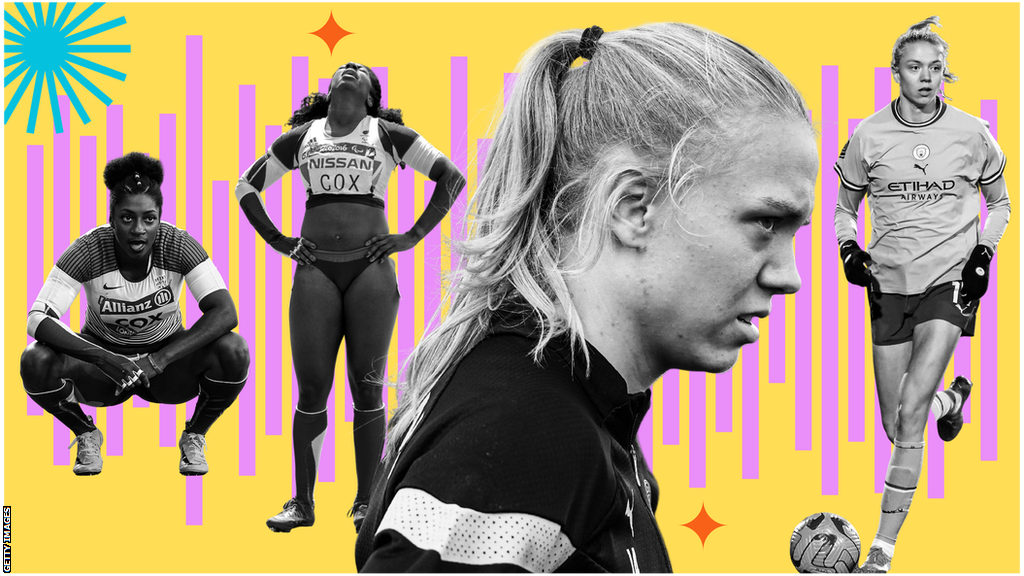Kadeena Cox and Esme Morgan on the mental impact of injuries
- Published

Paralympic champion Kadeena Cox knows more than most about injuries.
Ask trained physiotherapist Cox about the mental impact of them and she can recite a long list of hamstring tears, serious knee problems, Achilles issues and a concussion that have occurred at inopportune moments.
A knee injury kept her out of the 2018 Commonwealth Games. She fought through Achilles pain to reach the Tokyo Paralympics in 2021.
Three months ago, the dual-sport athlete had hip surgery and must now regain her fitness in time for the World Para Athletics Championships in July, and the Para-Cycling Track World Championships in August.
So when exploring what psychological impact injuries can have on athletes, she is the perfect person to ask.
Speaking on Women's Sport Matters - a Sports Desk podcast special produced with the Open University - Cox describes getting injured before a major event as "devastating".
"You work so hard to get to these major championships and one little wrong step and that's it, you've set yourself back," the 32-year-old explains.
"It can be really hard to deal with it if you don't have the right support around you."
Trying to train for the Paralympics through Achilles injuries was "the roughest three months" of Cox's life.
She experienced "an awful shooting pain" through her legs and says: "Every session I was walking off and crying, doing a lap around the track just wiping my tears away, then trying to collect myself and bring myself back in.
"I did that for a few weeks then realised there is a point where you have to stop pushing yourself like that, otherwise mentally you are going to break."
Cox eventually made it to Tokyo and, though limited time on the track meant she could not defend her T38 400m title, she added two cycling golds to her medal collection.
Identity crisis
Footballer Esme Morgan also knows a thing or two about injuries.
The Manchester City and England defender broke her leg during a match in 2022 and spent 12 months on the sidelines.
During surgery, a 40cm metal rod was inserted into her leg. On top of the physical pain, Morgan found herself in an identity crisis.
"I don't think you can ever prepare yourself for something like that," the 22-year-old says.
"Ever since I was a kid, I'd played football whenever I could, every single day. To all of a sudden be told you're going to be out for a year… I was like: 'What on earth am I going to do with my life?'"
Cox says she lost her identity when, after a promising early career as a non-disabled sprinter, she suffered a stroke and was then diagnosed with Multiple Sclerosis in 2014.
Having gone from 10 sessions a week to being bed-bound for two months, Cox recalls that period of her life as "dark times".
Open University expert Dr Caroline Heaney says that is a common psychological impact of injuries.
"Whether you're elite or lower level, when you're an athlete, sport is such an important part of your identity so when that is taken away from you when you are injured it is difficult to handle," she explains.
"You have those feelings of frustration, anger, depression and anxiety - all those things can be common."
'I felt like a failure'
Wondering who you are when you cannot be an athlete is not the only issue.
Morgan and Cox both discuss the fact that injury rehabilitation is often more time-consuming and arduous than training.
Then there is your speed of return to competition.
Dr Heaney highlights the importance of "appropriate and flexible goal-setting" during injury and Morgan has a perfect example of how setting too firm a target can go wrong.
When she spoke to the surgeon who, in her words, "would smash her leg back together", he told her recovery would take 6-12 months.
Morgan took that to mean she could be back on the pitch in six months, in time for what would be England's historic Euro 2022 campaign.
What it actually meant was that her leg might have healed in six months, but would not be ready for everything she usually put it through in a match.
"When I got to that five or six-month mark and I was still in pain just walking around, I felt like such a failure because I had been telling everyone I was going to be back in six months and I was nowhere close to reaching that goal," Morgan says.
Cox points out that sometimes you have to let go of such goals for the sake of your future health.
"I want to get to these championships but I need to make sure I recover so that in 20 or 30 years, I am not having to have hip replacements," she says.
Dr Heaney stresses that both elite and amateur athletes must consider the psychological side of an injury as well as physical recovery.
And Cox says that, even with so much experience, she still struggles with the mental aspect.
Morgan has some advice: "Mentally, that constant uncertainty and questioning is difficult. What I learnt to do is look back two weeks and think how far I had come in that short period of time.
"It would make the down days feel easier."
Sports Desk: Women's Sport Matters is a special mini-series produced in partnership with the Open University. The four episodes cover periods; sportswear; the psychology of injuries and exercise habits. You can listen to them here.

Elon Musk's Twitter Storm: Find out how the new owner is transforming the company
Are eco laundry products better for the environment? Greg Foot investigates how such claims come out in the wash...
